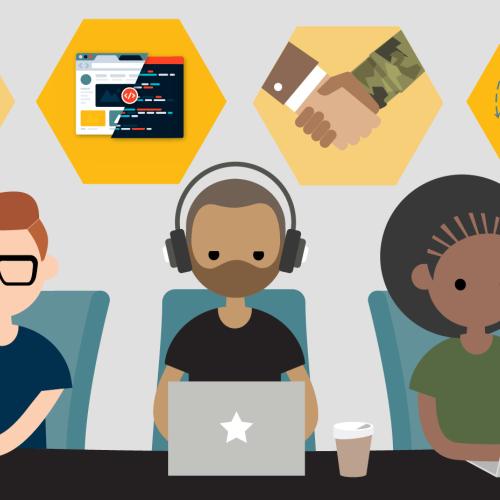Working and Learning Online During a Pandemic
Georgia Tech learners share tips for online learning success during uncertain times

Since the outbreak of COVID-19, universities across the country have quickly pivoted to remote delivery and other technologies as a means to mimic the in-person setting. This transition was intended to prioritize safety while providing continuity of instruction, but it was not without challenges.
For the more than 14,000 learners in Georgia Tech's online master's of science (OMS) programs, however, learning online is business as usual. These learners already carefully manage their time, adopt new technology, and take responsibility for their learning process.
Despite their veteran status with online education, it would have been impossible to prepare for other COVID-19 strains such as transitioning to remote work, family caregiving responsibilities, or homeschooling their children. However, their experience did provide them the skills needed to quickly recognize needed changes and the flexibility to adapt their typical learning environments to better accommodate an unprecedented situation.
With that in mind, we recently asked our online master's in analytics students how they stayed focused on their academic goals over the last few months. From finding a work-life balance to embracing uncertainty, they provided their best tips to help you make the most of your online learning experience at home.
Build a space conducive to learning.
As an online learner, your classroom is often your home, and distractions such as technology, work, and family can seem nearly impossible to avoid. One of the most important steps in eliminating distractions and staying focused on an online learning environment is creating a regular learning space.
Whether the kitchen table or a home office, setting up a dedicated space for learning and studying will help you stay organized, motivated, and accountable.
Now that she is working from home full-time, Rachel Carpenter has found that she struggles to separate her working environment from her studying environment. Small adjustments, such as changing into pajamas or switching playlists, have allowed her to mentally prepare for shifting from work into academic mode.
In addition, Jessica Warr has also found that investing in a pair of noise-canceling headphones has been essential for managing the added commotion of a full household.
Manage your time wisely.
Transitioning to an online environment can be a challenge, especially while balancing remote work and family, which is why time management and self-discipline are critical skills for success.
With the massive shift to remote work, you may find you have more control over your schedule and a good time to reevaluate your optimal working and learning style.
Are you more productive in the mornings, the afternoons, or the evenings? Do you work better in short intervals? Do you prefer a flexible working and learning environment, or would you rather have a structured schedule?
As best you can, establish a consistent framework that works for you – and stick to it. Sarnath Kannan structures his weekends to focus on schoolwork, whereas Warr absorbs her coursework more effectively before work and dedicates her mornings to studying.
It's also important to remember that online courses are rigorous and can consume a great deal of your time, which makes taking advantage of virtual tools critical. In addition to using the resources provided by the program, Sumit Mathur finds supplementing his online learning with YouTube tutorials helps to strengthen foundational knowledge.
Actively participate and leverage your community.
Social connection is an important aspect of online learning, and in trying times, it's even more essential.
From taking advantage of message boards, to utilizing online discussion forums, or facilitating online study sessions with classmates, getting involved with your online community will be essential to help stay motivated and engaged.
It's also ok (and even encouraged) to reach out for help. While outside circumstances may feel uncertain right now, it doesn't mean you have to do everything on your own. Reach out to your professors or student advisors if you're having trouble keeping up with your work or meeting deadlines. Maintaining open communication will help to deepen your virtual relationships while mitigating unexpected challenges.
Take care of your mental health.
In addition to social connection, it's also important to create digital boundaries to support your well-being, especially if you're juggling working, learning, and an active family life. This could be speaking with your family, friends, or work supervisor to establish long-term goals while setting expectations for yourself as both an employee and as a student.
While these conversations are key to help your success as an online learner, spending long hours in front of the computer can take a toll on your body and brain, so you'll want to make time to take care of yourself.
Remembering basic wellness and ergonomics practices, such as eating healthy meals, getting enough rest, and investing in fitness, are an important component of your mental well-being. Kannan suggests using an anti-glare screen protector and managing your screen time to help you stay focused, ensure you're taking regular breaks, and prevent burn out.
Carpenter also stresses the importance of remembering to be kind not only to yourself but also to your fellow classmates, remembering that "everyone handles the new normal in their own way."
Learning Online During a Pandemic
In light of the recent pandemic and increases in unemployment numbers, enrolling in a graduate or professional degree program can be a great way to further your education, advance your career, and improve your job prospects, according to a recent Strada Education Network survey.
But it's up to you to take charge of your education.
"Keep learning skills that allow you to adapt to changes and uncertainties in today's environment," emphasizes Reg Onglao-Drilon. "The pandemic has forced universities to shift to an online approach, and I'm glad Georgia Tech is one of the leaders in this space."

